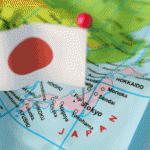Japanese ETFs Are An Interesting Buy
 Japan’s economy took a dive in the 2nd quarter. Their economy shrank at an annualized rate of 6.8%.
Japan’s economy took a dive in the 2nd quarter. Their economy shrank at an annualized rate of 6.8%.
Consumer spending plunged at an annualized rate of 18.7%, investment in housing dropped a staggering 35.3%, exports fell 1.8%, and business investment fell 9.7%.
Those are astonishingly bad numbers to say the least.
What’s going on with the world’s third largest economy?
In short, Japan raised sales tax from 5% to 8% on April 1st.
This had the predictable impact of decreasing household spending. The 18.7% drop last quarter was the largest decrease since 1974.
It makes sense, the tax hike wasn’t a secret… so Japanese consumers went on a shopping spree the last few months ahead of the tax increase.
That shopping spree caused Japan’s GDP to grow by 6.1% in the 1st quarter. And now that the tax hike is here, consumers aren’t buying as much stuff.
Here’s the thing…
I believe investors should consider investing in Japanese ETFs despite the horrendous 2nd quarter GDP results.
The country needed to increase tax revenues. Government debt has ballooned to an eye-popping 240% of GDP. And the 3% hike in consumption tax will increase tax revenue.
The amazing thing is the 6.8% drop in GDP was better than expected! The average forecast was for a 7.1% drop in GDP.
The impact of the tax hike could have been much worse. And it’s essentially just a reversal of the 6.1% growth they had in the first quarter run up to the tax hike.
What’s more, a consumption tax doesn’t hurt economic growth as other forms of taxes. Taxing capital, income, or corporations has a bigger impact on economic growth than a consumption tax.
And don’t forget, the current monetary policy in Japan is very good for economic growth. They’re running a form of quantitative easing similar to the US. But it’s much more aggressive… 75% of all government debt is being bought by the Japanese central bank.
The bottom line is Japan was stuck between a rock and a hard place.
They needed to increase tax revenue and do it without hurting the economy. That’s a difficult feat to pull off. But the combination of an increased consumption tax along with monetary policy that promotes growth is the best possible solution.
I believe the Japanese economy will rebound in the 2nd half of the year. And that bodes well for Japanese stocks and the ETFs that hold them.
The most popular US listed ETF for investing in Japanese stocks is iShares MSCI Japan Index Fund (EWJ). It has $14.8 billion in assets under management.
Right now EWJ trades for $11.94. So far this year, EWJ is down 1.9% but it’s 11.6% above the 52-week low of $10.69.
Another popular ETF for investing in Japanese stocks is the WisdomTree Japan Hedged Equity Fund (DXJ). It has $9.9 billion in assets under management.
This ETF is hedged against fluctuations in the value of the US Dollar and the Japanese Yen. So you get the true performance of Japanese stocks with the effect of currency fluctuations.
Right now DXJ trades for $49.56. It’s down 2.5% so far this year and 16.8% above the 52-week low of $42.42.
The current Japanese leadership has taken aggressive actions to jump start economic growth and grow tax revenues. And the short term impact has been a staggering drop in GDP growth.
But over the long run, these actions are likely to pay off. I believe we’ll see the Japanese economy pull out of the deflationary spiral and begin to grow at a much faster pace than we’ve seen over the last few decades.
That’s good news for Japanese stocks and ETFs like EWJ and DXJ.
Good Investing,
Corey Williams
Category: ETFs, Foreign Market ETFs, Market Analysis




